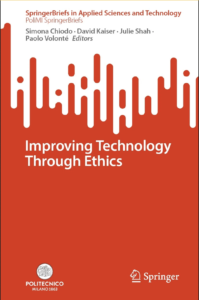
Bartolomucci, F., Trasciani, G., Gerli, F. (2024).
Social and Technological Innovation: Cross-Fertilization Needed. In: Chiodo, S., Kaiser, D., Shah, J., Volonté, P. (eds) Improving Technology Through Ethics. SpringerBriefs in Applied Sciences and Technology(). Springer, Cham. https://doi.org/10.1007/978-3-031-52962-7_8
Abstract
A growing interest in the use of technology to solve societal problems has raised in recent years. However, technological applications that aim to tackle societal challenges frequently risk having unintended negative consequences, particularly for underrepresented and disadvantaged groups. This is the case, for instance, with data-intensive technologies and applications for the sharing economy. A way to prevent the generation of negative externalities may be the contamination of conventional tech innovation processes with social innovation distilled features. This contamination act could be advantageous for both social and technological actors and strengthen the collective capacity to generate impact through technology. However, it requires rethinking innovation processes and the roles various actors play inside them as well as reconceptualizing innovation drivers and value redistribution mechanisms. In this chapter, we will discuss the potential benefits of contaminating the two paradigms. We conclude with a reflection on the role that Universities play in this scenario.

Springer, in cooperation with Politecnico di Milano, publishes the PoliMI Springer- Briefs, concise summaries of cutting-edge research and practical applications across a wide spectrum of fields. Featuring compact volumes of 50 to 125 (150 as a maximum) pages, the series covers a range of contents from professional to academic in the research areas carried out at Politecnico.
“Social and Technological Innovation: Cross-Fertilization Needed” is the eighth chapter of the book “Improving Technology Through Ethics” written by Simona Chiodo, David Kaiser, Julie Shah, Paolo Volonté.
This book deals with the ethics of technology and addresses specific ethical problems related to some emerging technologies, mainly in the field of computer science (from machine learning models to extracting value from data to human–robot interaction). The contributions are authored mainly by scholars in ICT and other engineering fields who reflect on ethical and societal issues emerging from their own research activity. Thus, rather uniquely, the work overcomes the traditional divide between pure ethical theory that disregards what practitioners do and mere R&D practice that ignores what theorists conceptualize. Conversely, the reader is enabled to understand what ethics means when it is actually put into work by engineering researchers. The book arises from a joint program between MIT and Politecnico di Milano aimed at training early career researchers in addressing the ethical issues of technology and critically reflecting on the social impacts of the emerging, and even disruptive, technologies they are currently developing through their novel research. Overall, it aims at spreading the task of developing technologies that, from the beginning, are designed to be responsible for human life, society, and nature.






